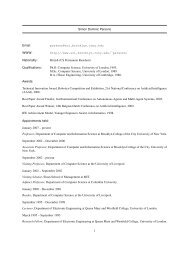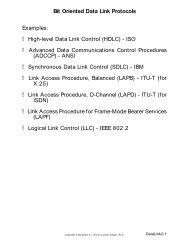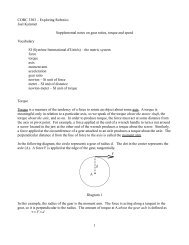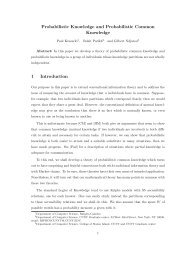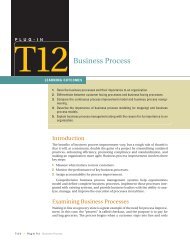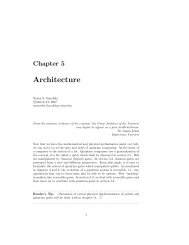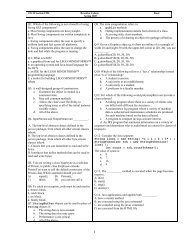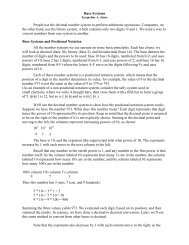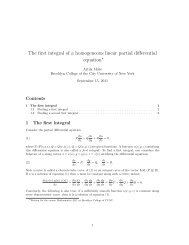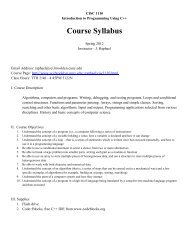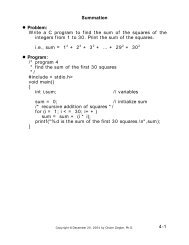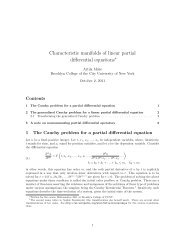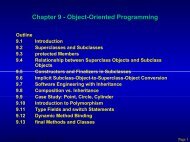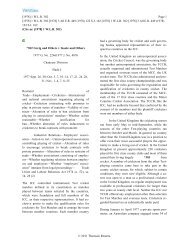Toward a Unified Theory of Human-Agent Modeling: A Position Paper
Toward a Unified Theory of Human-Agent Modeling: A Position Paper
Toward a Unified Theory of Human-Agent Modeling: A Position Paper
You also want an ePaper? Increase the reach of your titles
YUMPU automatically turns print PDFs into web optimized ePapers that Google loves.
References<br />
1. Tang, Y., Parsons, S., Sklar, E.: An agent-based model that relates investment in<br />
education to economic prosperity. In: Autonomous <strong>Agent</strong>s and Multiagent Systems<br />
(AAMAS). (2007)<br />
2. Sklar, E., Icke, I.: Using simulation to evaluate data-driven agents. Multi-agent<br />
Based Simulation (MABS) LNAI 5269 (2009)<br />
3. Pearl, J.: Probabilistic reasoning in intelligent systems: networks <strong>of</strong> plausible inference.<br />
Morgan Kaufmann (1988)<br />
4. Russell, S., Norvig, P.: Artificial Intelligence. Prentice Hall (2003)<br />
5. Pollack, J.B., Blair, A.D.: Co-evolution in the successful learning <strong>of</strong> backgammon<br />
strategy. Machine Learning 32 (1998)<br />
6. Sklar, E., Davies, M.: Multiagent simulation <strong>of</strong> learning environments. In: Autonomous<br />
<strong>Agent</strong>s and Multi <strong>Agent</strong> Systems (AAMAS). (2005)<br />
7. Spoelstra, M., Sklar, E.: Using simulation to model and understand group learning.<br />
<strong>Agent</strong> Based Systems for <strong>Human</strong> Learning, International Transactions on Systems<br />
Science and Applications 4(1) (2008)<br />
8. Salvit, J., Sklar, E.: <strong>Toward</strong> a myers-briggs type indicator model <strong>of</strong> agent behavior.<br />
Multi-<strong>Agent</strong>-Based Simulation (MABS) LNAI 6532 (2010)<br />
9. Sklar, E., Blair, A.D., Funes, P., Pollack, J.: Training Intelligent <strong>Agent</strong>s Using<br />
<strong>Human</strong> Internet Data. In: Intelligent <strong>Agent</strong> Technology (IAT). (1999)<br />
10. Sklar, E., Blair, A.D., Pollack, J.B.: Ch 8: Training Intelligent <strong>Agent</strong>s Using <strong>Human</strong><br />
Data Collected on the Internet. In: <strong>Agent</strong> Engineering. World Scientific (2001)<br />
11. Munoz, J.P., Ozgelen, A.T., Sklar, E.: Learning from Demonstration in Spatial<br />
Exploration. In: AAAI Robotics Workshop and Exhibition. (2011)<br />
12. Funes, P., Sklar, E., Juillé, H., Pollack, J.B.: Animal-Animat Coevolution: Using<br />
the Animal Population as Fitness Function. In: Simulation <strong>of</strong> Adaptive Behavior<br />
(SAB), MIT Press (1998)<br />
13. Rumelhart, D.E., Hinton, G.E., Williams, R.J.: Learning representations by backpropagating<br />
errors. Nature 323 (1986)<br />
14. Sklar, E.: CEL: A Framework for Enabling an Internet Learning Community. PhD<br />
thesis, CS Dept, Brandeis Univ, Advisor: J. Pollack (2000)<br />
15. Raphael, J.: Masters thesis proposal: Social learning as a method <strong>of</strong> knowledge<br />
transfer for a tetris agent. CIS Dept, Brooklyn College, CUNY, Advisor: E. Sklar<br />
(Jan 2012)<br />
16. Auyeung, K.Y.: Masters thesis proposal: A neural network approach to developing<br />
robust poker strategies. CIS Dept, Brooklyn College, CUNY, Advisor: E. Sklar<br />
(Jan 2012)<br />
17. Chernova, S., Veloso, M.: Interactive policy learning through confidence-based<br />
autonomy. JAIR 34(1) (2009)<br />
18. Lazarus, R.S.: Cognition and Motivation in Emotion. American Psychologist 46(4)<br />
(1991)<br />
19. Gardner, H.: Frames <strong>of</strong> Mind. BasicBooks (1983)<br />
20. <strong>Paper</strong>t, S., Harel, I.: Constructionism. Ablex (1991)<br />
21. Rote, G.: Computing the minimum hausdorff distance between two point sets on<br />
a line under translation. Information Processing Letters 38 (1991)<br />
22. Salvit, J.: A Myers-Briggs Type Indicator Model <strong>of</strong> <strong>Agent</strong> Behavior. Master’s<br />
thesis, CIS Dept, Brooklyn College, CUNY, Advisor: E. Sklar (2012)<br />
23. Myers, I.B., Myers, P.B.: Gifts Differing. Consulting Psychologists Press (1980)<br />
24. Resnick, M.: Turtles, Termites, and Traffic Jams: Explorations in Massively Parallel<br />
Microworlds. MIT Press (1997)



